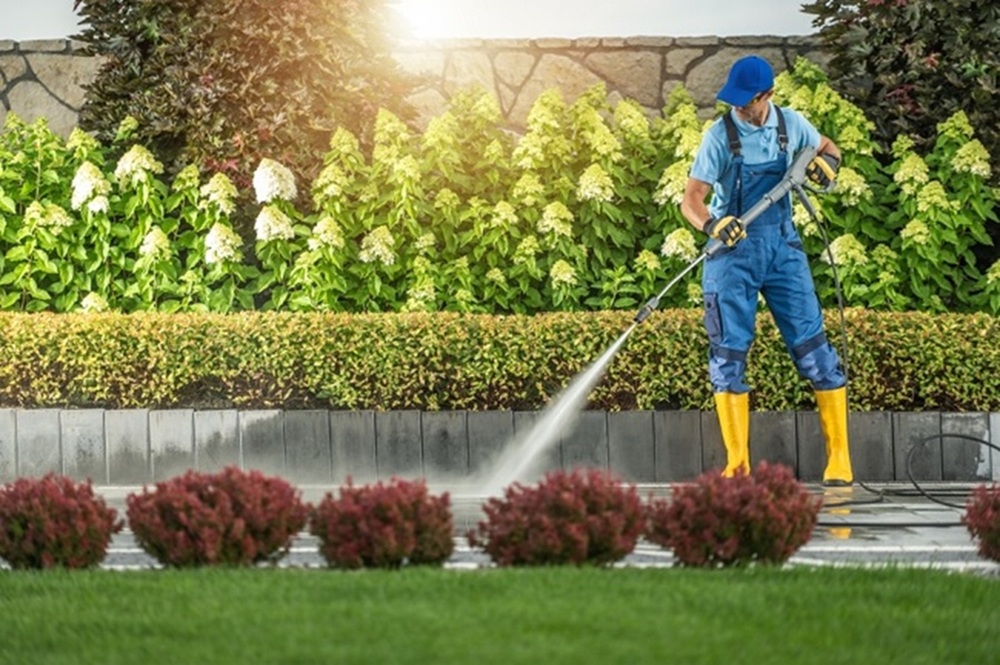The Ultimate Guide To Driveway Cleaning For Homeowners

What makes your neighbour’s driveway look like something out of a home magazine while yours resembles a Jackson Pollock painting gone wrong with oil stains and dirt? Just those stubborn marks that seem to mock you as you try to clean them with a garden hose? Bit embarrassed whenever your guests steer up to your place?
The driveway is not merely a place to park one’s wheels; it is the red carpet of your home and the first impression that visitors have about your property. Unfortunately, more often, the driveway is the area that receives the least amount of regular upkeep. In this guide, we will discuss everything one needs to turn an unimpressive driveway into a shiny welcome mat that will make your neighbor green with envy.
It will cover all the important choices, from recognizing the demands of different driveway materials to the resolution of pressure washing art. We’ll see what type of stains warrant pressure cleaning and which ones need a milder approach with soft washing. Also, you will see which cleaning agents work best for the really stubborn stains, some tricks to help you avoid costly mistakes, and when to really say ‘help’. By the end of this guide, you’ll know all there is to know to keep that driveway in pristine shape year-round.
Understanding Different Driveway Materials And Their Cleaning Needs
Not all driveways are created unequal, and what’s good for your mate’s concrete drive could be disastrous for your beautiful block paving. Understanding the surface your driveway is made of is the first consideration in achieving that showroom look without causing costly damage. Each surface has its personality, idiosyncrasy, and inherent requirement you need to respect.
The good part is, once you know what the surface is, then it becomes much easier to choose the cleaning style. Kind of like choosing a shampoo for your hair type – you won’t use a clarifying shampoo for colour-treated hair, will you? The same applies to your driveway. Let’s start with the two most common types you’ll find in Australian homes.
Concrete Driveways
Concrete driveways have strength and durability to endure punishment; they are the workhorses of the driveway world. All over Australia, they work through the blazing sun and torrential downpours without so much as a second thought. Unfortunately, concrete is porous, and these blemishes-oils, tyre marks, and other nasty little blemishes-also absorb concrete and can make it look decades older.
It is better if the conditions for pressure washing concrete driveway surfaces are there. They can withstand tremendous pressures ranging from 2,500 PSI to 3,000 PSI without incurring any damage, thus making good home cleaning activities against stubborn stains, which otherwise would have meant vigorous washing through conventional means. Concrete is tough, but it isn’t indestructible. Excessive concentrated pressure will etch and damage the surface if the surface is not allowed to dry out and withstand uneven pressurizing; otherwise, it may come out unscathed.
Paved And Block Paving Driveways
Although with their eye-catching patterns and differing colours block paving driveways impart instant kerb appeal, they shall require additional consideration when being cleaned. Individual blocks or pavers possess multiple joints filled with sand, which can be easily blasted away by the improper use of pressure washing. Excessive washing may put your attractive paving on unstable footing for weeds to colonize.
When pressure cleaning block-paved driveway surfaces, lower pressure settings (1,500-2,000 PSI) are used. The idea is to obtain a clean driveway and yet conserve the integrity of the joint sand. Rather than pointing directly in the joints with the pressure washer, aim it at a slight angle and keep the nozzle moving so that pressure is not concentrated in one area for too long.
Vital Equipment For Driveway Cleaning

With the proper tools in hand, you can turn your weekend into the gratifying experience it should be, rather than an exercise in frustration. While you may not want to immediately invest in industrial-grade construction cleaning equipment, the right few pieces will greatly profit your driveway-cleaning adventures.
At the heart of the serious driveway-cleaning arsenal lies the pressure washer. However, before one goes out to purchase the biggest and baddest machine he can find, understanding his needs becomes an important consideration. Without doubt, having more power does not always mean having better performance, and indeed, a very power-efficient machine can perform the job neatly and would be easier in handling without causing unwanted damage to the surfaces concerned.
Difference Between Pressure Washers And Power Washers?
Now we’re entering serious confusion: aren’t pressure washers and power washers synonymous? Well, not quite, and understanding the difference could keep you from making a costly mistake. The main difference is one rather simply put: heat. Power washers use hot water whereas pressure washers limit themselves to cold only.
They are able to do the majority of residential driveway cleaning jobs regardless of whether they are rated for cold water or hot water. These machines use cold water under high pressure to jet dirt, grime, and a majority of stains away. They are cheaper to buy and maintain, and these machines are just right for an average cleaning job. For beginners in pressure washing driveway surfaces, the starting option is to use a pressure washer because it offers excess control and little risk of damage from heat.
Heavy Duty Cleansing Equipment For Construction Clean-Ups
Sometimes a residential cleaning project becomes stagnant over years of neglect or with persistent stain issues, whereby normal cleaning equipment can just not suffice. This is the point where construction cleaning devices come in. These industrial-grade tools are made to deal with the most severe cleaning issues: from paint overspray down to a centuries-old grime buildup.
Professional-grade pressure washers are usually superior in pressure (3,000 psi and up) and in built of more durable components made for continuous use. They usually come with a plethora of special nozzles and attachments, such as rotary surface cleaners that make the job go fast over large areas. Some types even have adjustable settings for pressure and temperature for maximum flexibility during different cleaning jobs.
Soft Wash Treatment For Driveways: The Gentler Way
Not every driveway cleaning job needs the full wrath of a pressure washer. Actually, there are times when a soft wash treatment for driveway surfaces is preferable and, at times, even a must. The gentle way involves the application of low-pressure water combined with specially formulated cleaning solutions that can deliver outstanding results without damaging the surfaces.
Soft washing is gaining traction among professional cleaners and discerning homeowners alike, and for plenty of reasons. For one, it works especially well against biological prospects and infestations, like algae and moss, which can be challenging to remove through pressure once they grab hold. Some serious cleaning is taken care of by the cleaning solution itself, which breaks down the contaminants at a molecular level, rather than a heavy-duty blasting, under pressure applied with as little force as a garden hose.
When To Use Soft Washing Instead Of Pressure Cleaning
Knowing when soft-washing techniques can be effective, rather than just putting on pressure-cleaning techniques for driveways, will save time and resources – not to mention headaches. For driveways with delicate surfaces such as stamped concrete or decorative pavers, or when a sealant has just been applied, the safest choice to make certainly is soft washing. These surfaces have high susceptibility to high-pressure water and damaging these surfaces may cost a pretty penny to repair or at the very least depart from their original appearance.
Soft washing shines in the arena of biological growth. Pressure washing will always provide Apossibly-free time against future moss growth if the driveway remains greenish black with algae and moss. Since: The spores stay embedded in the porous surface, it is only a matter of time before they re-establish growth again. The spores are what is addressed by the use of biocides in the soft wash solution, which means cleaner driveways for much longer.
Benefits Of Soft Wash Treatment
The advantages of soft washing go far beyond just being kinder on surfaces. For a start, it uses significantly less water than traditional pressure washing – 90 percent less in some cases. Being more environmentally friendly is especially tempting to customers in environmentally conscious areas facing the quickly looming prospect of drought. And don’t forget, your water bill would give you a pat in the back too!
Soft washing beats pressure washing for removing certain stains and growth. The cleaning solutions have time to penetrate deeply into porous surfaces and break down contaminants that pressure washing might only superficially address. This deep cleaning translates to a driveway that looks much cleaner and stays clean for substantially greater lengths of time – sometimes as much as four times longer than from pressure washing alone.
How To Power Wash Your Driveway Safely And Effectively
One can hardly argue for safety and that it is an exciting topic, but that is hardly a reason to neglect a most important consideration, i.e. power washing of a driveway should be done safely for your own and your property as well as for the best results. Injuries and damages of property can be inflicted during power washing, which is why all standards of safety must be upheld.
You should check for safeties before cleaning my driveway. Check your equipment by looking for any sign of damage, checking all the connections, and very importantly verify that the trigger lock and safety features are working. Before entering the work area, put on safety goggles along with slip-resistant, closed-toe shoe wear, and long pants. The high-pressure water may cause small bits of dirt to become a projectile and we should give some respect to the cleaning chemicals.
Protection Of Surrounding Plants And Property
After years, your garden has become the pride and glory of your life; don’t let it be all ruined by one afternoon’s worth of driveway cleaning. Unless you take care, high-pressure water and cleaning chemicals can wreak havoc on tender plants, strip paint from fences, and even affect the seals of windows. So, guarding your environments is also providing yourself peace out mind and enable your sober attention to walking down the pathway to cleaning.
Prior to initiating the cleaning process, saturate the area with water. Hydrated healthy plants generally resist exposure to chemicals as water forms a physical barrier on leaves. If possible, loosely cover delicate flowering plants, trees, and shrubs with a plastic shroud or some old bedding to allow some air flow. During the cleaning process, larger plants and trees can be doused with a gentle spray from a garden hose to minimize detrimental effects from overspray.
Conclusion
Your driveway is not just a place for parking but also adds to the appearance and value of your house. In this guide, we have discussed everything about driveway cleaning from understanding different materials to master cleaning techniques. Whether you want to go with traditional pressure cleaning, soft wash treatments, or a combination of both, you now have the confidence to handle any driveway problem.




